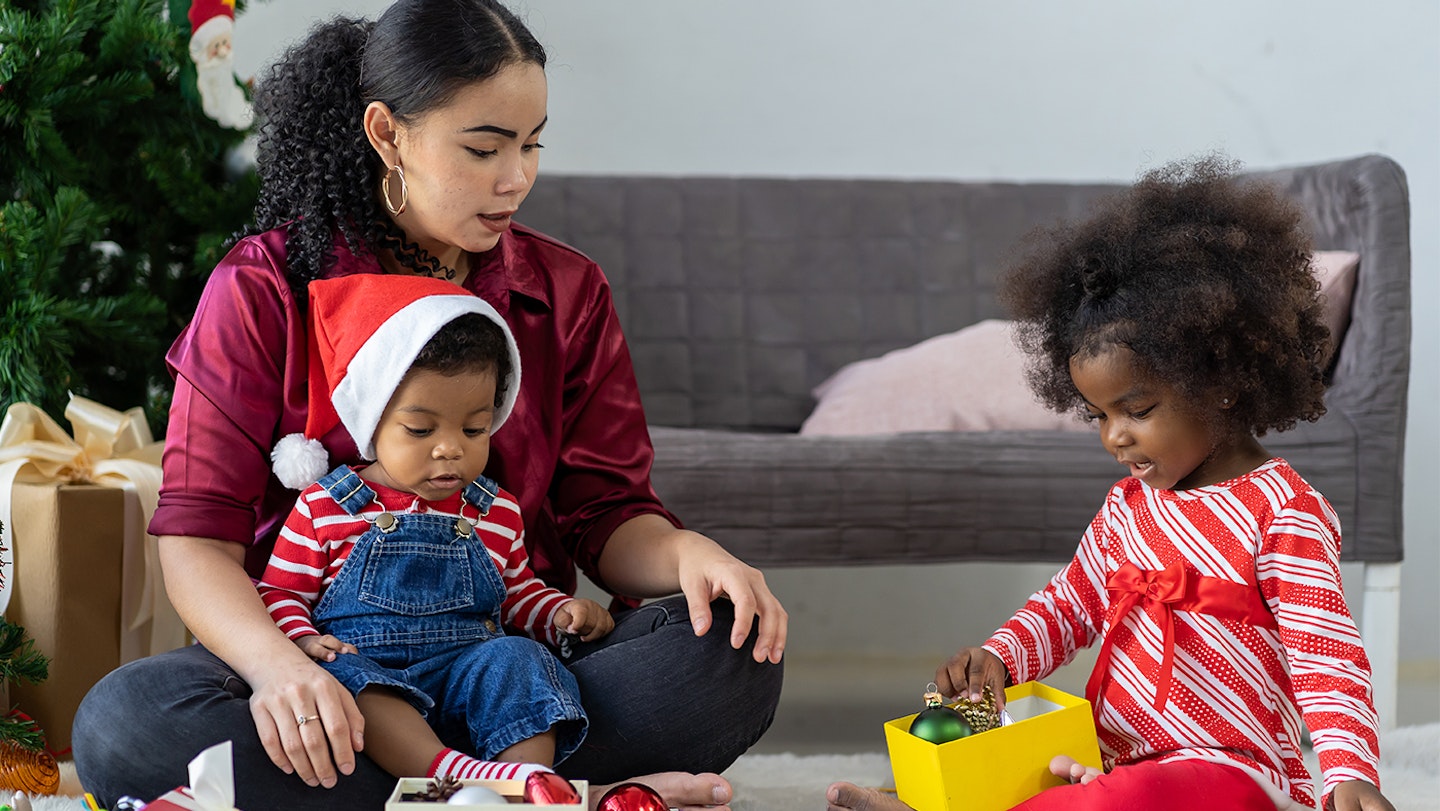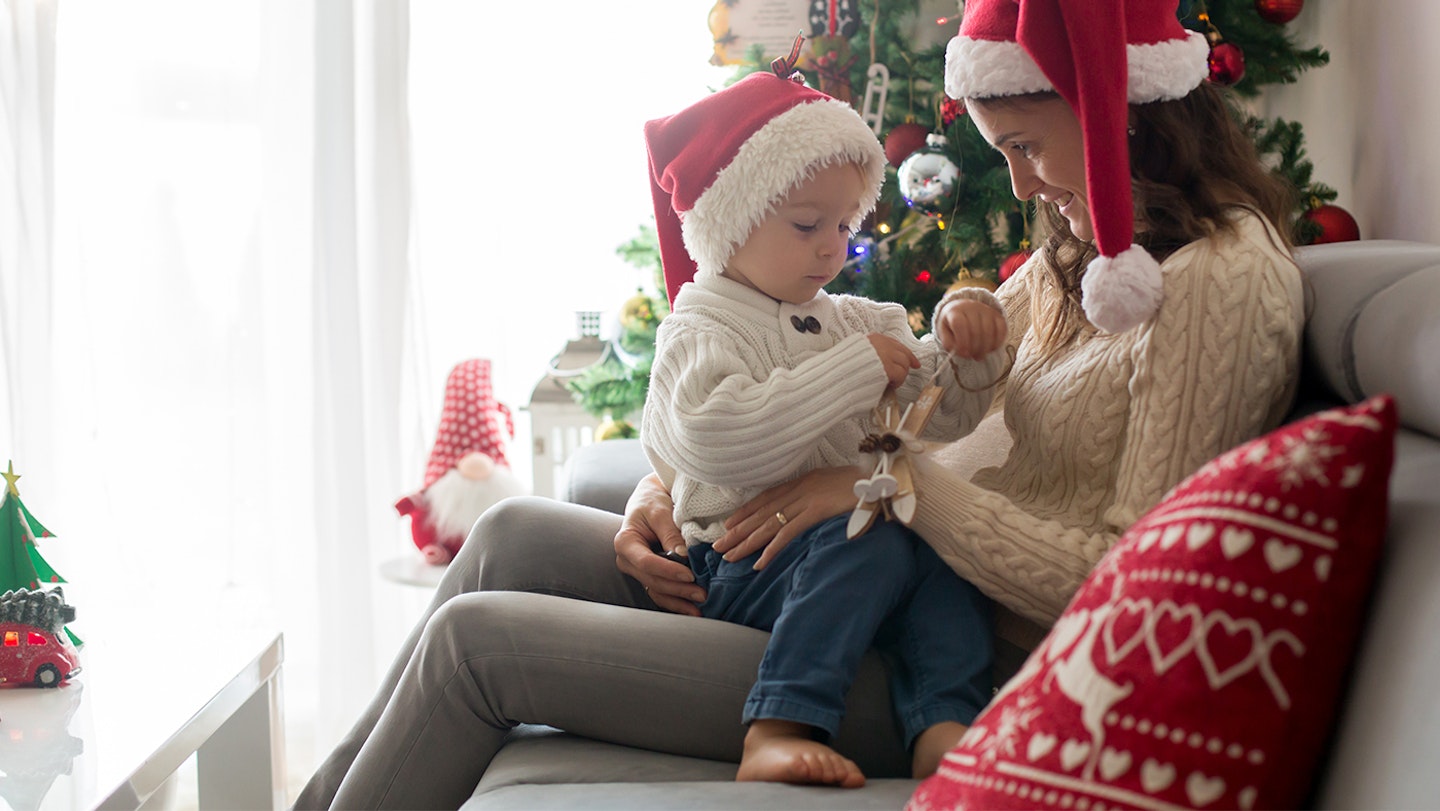Like it or not, festive flashpoints like tantrums from overtired and overstimulated young children are as much a part of Christmas as roast turkey and fairy lights. But it is possible to prep for what could be tricky moments with young kids and to keep your festive plans as toddler-friendly as possible.
Whether you have imagined a perfect Christmas with an angelic toddler in their festive finery, laughing and giggling their way through Christmas while extended family look on and coo, the fact is that reality will probably look very different. For every family, there will be moments over Christmas when the carousel of activities, noise, bigger dining tables and different food can get a bit much for the littlest people and emotions may run high.
Festive overwhelm
Christmas can feel like a lot in terms of socialising and expectation for adults, never mind for little ones who could very well feel overwhelmed.
Georgina Hood OBE is Principal of Paint Pots Montessori Schools and creative classes. She tells us that, for little ones, the Christmas schedule can be a lot to deal with: “Staying away from home with friends and family or having family staying in your home can be overwhelming. Equally so can the noise and excitement and a lack of routine. On top of that, too much enforced fun! Topped by an overwhelming amount of gifts to open! This could lead to sensory overload and a meltdown.”

Jemma Munford is a toddler sleep expert and runs Blissed Out Babies. She says, “Tantrums and challenging behaviour are a toddler’s way of expressing that they're overstimulated or overwhelmed.New decorations, more people, days filled with activities, and unfamiliar foods can sometimes lead to overwhelm and meltdowns.”
The above is all especially important to bear in mind if your child has sensory processing difficulties.
Prep the grandparents
It can be wise to minimise expectations of family or visitors. There’s a lot for toddlers and young children to process over the Christmas period with different food, people, decorations and activities all occurring. Jemma explains, “Adults often forget that toddlers are still developing their understanding of the world. Many toddlers enjoy the sensory aspects of Christmas but don’t grasp its full meaning.”
It's natural that grandparents or other relatives will want to make the festive season special but small children can sometimes be unmoved or confused by all the different sensory experiences. Jemma adds, “Toddlers might show excitement in bursts but may not display constant enthusiasm. A helpful way to adjust family expectations is to explain that toddlers show excitement in short bursts and need breaks or downtime. Let family members know they may not get long hugs, huge smiles, or continuous engagement, but that what toddlers give is age appropriate.”
Stick to routine
Routine is key for young children, even more so when everything else is out of whack. If you are away from home or out for long days, disruption will be unavoidable, but it can help to keep fundamental parts of their sleeping and eating routine in place. As Jemma tells us, “Keeping familiar elements of their routine can be grounding, especially if you’re away from home. Aim to stick to usual nap and mealtime windows as much as possible, even if the timing isn’t perfect. Small adjustments – like ensuring they have some quiet, calm time before nap or bedtime – can help them recharge and manage all the holiday excitement.”
There are a few triggers which can cause a meltdown, as Jemma outlines: “Toddlers are sensitive to hunger, tiredness, thirst, discomfort, and boredom. Meltdowns can often be avoided by staying attuned to their needs amid the excitement.”
Jemma has advice for trying to keep a nap schedule in place: “Imagine you’re at Grandma’s house, where there’s excitement all around with cousins running around and adults chatting. For a toddler used to napping after lunch at home, this change can feel overwhelming. By keeping the nap routine somewhat consistent – perhaps by bringing a favourite blanket or storybook – they’re more likely to settle.”
Explain ahead of time
So much of Christmas is a brand-new experience for children. The experts say it’s wise to prep little ones for what they might be doing. For example, seeing lots of lights and decorations, what a choir might do at a carol concert and whilst queuing up to see Santa, reassuring them about what’s going to happen instead waiting for a huge shock.

Georgina suggests not starting too early with explanations as the children will forget but to try and keep things low key: “Simple books perhaps can be used to prepare them for what is happening. However, it does not make sense to do this too far ahead.”
Dear Santa, Stick Man and Alfie’s Christmas are three such titles we like.
However you prepare, try to keep in mind how your little one might react. Georgina adds, “Where possible keep the festive time as simple as possible and look at each part through their eyes to gauge what might or might not work overall for you as a family.”
Keep gifts in check
There’s no doubt that well-meaning family and friends will want to shower your little one with gifts, but a huge conveyor belt of Christmas presents can be overwhelming, and toddlers quickly lose interest. Instead, Georgina advises, “Regarding a huge amount of gifts to open, perhaps diplomatically remove or stagger gift opening over a number of days, depending on who you are with.”
We all know the adage that toddlers prefer boxes to actual presents. Keep this in mind. It may mean present giving drags on over a few days as your little one gets absorbed in the wrapping paper or packaging but, on the other hand, you are extending the festive joy.
It’s wise to take present opening slowly and, according to Jemma, go at the pace of the smallest person. “During gift opening, let the toddler engage at their own pace; if they wander off or want a snack break, it’s perfectly normal. This can help prevent pressure and disappointment and allow the toddler to enjoy the day in their own way.”
Know when to go
Despite anyone’s best efforts, tiredness, hunger or overwhelm can spill over into a meltdown. If this happens, tread gently with your little one and don’t be afraid to remove yourselves from the situation. Georgina says, “I would suggest being more on the lenient side, and perhaps bringing your visit to an end. Say something like, ‘I can see you are feeling overwhelmed, I am feeling tired too – let’s go home now.’”
Work as a team with your partner to sense when a meltdown may be on the cards. Jemma suggests having a loose plan in place for this. “Having a flexible plan such as when to take a break or leave if needed, helps both of you feel prepared and able to be attuned to your toddler’s needs. Discussing options for naps and having a code word that signals ‘it’s time to leave’ ensures you’re both ready to respond calmly and consistently if emotions run high.”
If you're at home and it all gets a bit too much for your child, perhaps have a quiet space they can go to where they can be calm and away from all the Christmas chaos, and keep a close eye on those nap cues.

Real mum experiences
'In the run-up to Christmas, we focus on home-based activities: baking, making Christmas decorations, watching Christmas films. We just have one special trip out – a visit to Santa’s grotto or a ride on a festive steam train. Keeping things relaxed stops the kids from getting overwhelmed, and the bonus is that the one event we do feels extra-memorable and exciting.’ Rachel Evetts, from Darlington, is mum to Thomas and Sophie.
'I’m planning to have only a few presents under the tree for Leo. I think a small number of presents that he will really want to play with will be fun, but a huge pile of brightly wrapped goodies would tip him into a fever-pitch of excitement that would be too much. Less is more!’ Rachel Vincent-Lee, from Brighton, is mum to Leo.
'Theia always copes better when we tell her what’s going to be happening. Last Christmas we had a really busy day – we opened some presents, did a park run, visited grandparents, dropped off old toys to a charity collection, visited friends, then came home for more presents and bed. We’d gone through the day in advance and there was no upset, even though it was tiring and out of routine.’ Ria Binney from Peacehaven, is mum to Orin and Theia.
Georgina Hood OBE is Principal of Paint Pots Montessori Schools and creative classes.
Jemma Munford is a toddler sleep expert and runs Blissed Out Babies and can be found on Instagram at @blissedoutbabies.
As a freelance writer, Jo Dunbar covers parenting, health and lifestyle with the odd opinion-based rant and celebrity interview thrown in.
